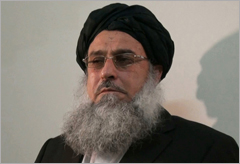Kandahar Media Information Center have just put out this pic of a mid-level Taliban commander wearing a burqa and disguised as a woman. He was arrested by the Afghan Border Police. Nice dress.
Afghanistan in 2025
5 days ago
A glance at the conflict in Afghanistan

 |
| Still from Taliban video of Camp Bastion attack |
 |
| Taliban negotiator Sohail Shaheen |
 |
| Syed Rasool |
HRW points out to the case of Malik Ishaq, the leader of Lashkar-e-Jhangvi, who despite being the accused in some 44 cases that involve the killing of around 70 people, mostly Shias, has previously been acquitted by Pakistani courts in 34 of those cases and granted bail in the other 10. He was arrested (again) in Lahore on 31 August under the provisions of the Maintenance of Public Order Act as a threat to public security. It remains to be seen whether he will ever face trial."Human Rights Watch urged Pakistan’s federal government and relevant provincial governments to make all possible efforts to promptly apprehend and prosecute those responsible for recent attacks and other crimes targeting the Shia population. The government should direct civilian agencies and the military responsible for security to actively protect those facing attack from extremist groups, and to address the growing perception, particularly in Balochistan and Pakistan’s tribal areas, that state authorities look the other way when Shia are attacked. It should increase the number of security personnel in Shia majority areas and enclaves at high risk of attack, particularly the Hazara community in Quetta. The government should also actively investigate allegations of collusion between Sunni militant groups and military intelligence and paramilitary forces and hold accountable personnel found to be involved in criminal acts."
 |
| Carol Grayson pic: CAAB |